Friday, June 30, 2006
A Black Eye But Not A Knock Out
According to CNN, the resolution "condemns the unauthorized disclosure of classified information" and "expects the cooperation of all news media organizations in protecting the lives of Americans and the capability of the government to identify, disrupt and capture terrorists by not disclosing classified intelligence programs such as the Terrorist Finance Tracking Program. The resolution, passed 227-183 on a largely party-line vote, did not specifically name the news organizations, but it was aimed at The New York Times and other news media that last week reported on a secret CIA-Treasury program to track millions of financial records in search of terrorists. The Times has defended its reporting, saying publication has served America's public interest. Its executive editor, Bill Keller, said in a statement after the House passed the resolution that the paper took seriously the risks of reporting on intelligence. "We have on many occasions withheld information when lives were at stake, however, the administration simply did not make a convincing case that describing our efforts to monitor international banking presented such a danger. Indeed, the administration itself has talked publicly and repeatedly about its successes in the area of financial surveillance."
This of course was seen differently in the eyes of House Republican’s. Financial Services Committee chairman, Rep. Michael Oxley, R-Ohio noted, "the recent front-page story in the aforementioned New York Times cut the legs out from under this program," said the. "Now the terrorists are well-informed of the details of our methods and will find other ways to move money outside of the formal financial system."
It is at this juncture that one needs to consider that fact that terrorists have already and currently are moving money outside the formal financial system, and have been doing this since the program began.
Most Democrats opposed the measure, protesting language in it that asserts that the Terrorist Finance Tracking Program was "rooted in sound legal authority" and that members of Congress had been appropriately briefed on the program. Democrats also reacted angrily to the GOP majority's refusal to allow them to offer an alternative that would also have expressed concerns about the unauthorized leak of classified information but would have left out language defending the legality of the program. Rep. Barney Frank, D-Massachusetts, author of the alternative, said, "What you have done is to hijack the virtually unanimous support for tracking terrorist financing into an endorsement of the way the Bush administration has conducted itself."
The bill by the Republican’s and the almost scripted response by the Democrat’s can be seen as nothing more than electioneering, due to the upcoming fall elections. However, the action itself is cause to pause. Within the American experiment we call Democracy, the press, or more appropriate in today language, Media, is more than a concept. The press is a separate and, almost, sacred institution, the fourth estate, and protected under our Constitution. Such a resolution undercuts the responsibility of this nation’s media, while at the same time vindicating its historic role as buffer between government and citizen as well as its tradition. An educated citizenry are so due to its press. Let us all remember this, honor and respect it.
Thursday, June 29, 2006
Ego Boost
In a post from May, entitled, "Show Me The Money" I speak on this very idea.
The film, Why We Fight by Director Eugene Jarecki (The Trials of Henry Kissinger) has used the film as a commentary on the contemporary obsession of the American elite with military power. Harking back to a speech by President Eisenhower, who, just before he left office, referred to the "military-industrial complex" that included too much intelligence, and too much business acumen in America, becoming focussed on the production of unnecessary weapons systems. Below is a link that will allow you to view the trailer. I highly recommend all to see this this film.
http://www.sonyclassics.com/whywefight/
Guantanamo Bay Tribunals Illegal
The U.S. Supreme Court on Thursday strongly limited the power of the Administration to conduct military tribunals for suspected terrorists imprisoned at the U.S. Navy base in Guantanamo Bay, Cuba. The 5-3 ruling means officials will have to come up with a new policy to prosecute at least 10 so-called "enemy combatants" awaiting trial. And though the Court did not address the government's right to detain suspects, this case was a major test of Bush's authority as commander in chief during war.
President Bush has aggressively asserted the power of the government to capture, detain and prosecute suspected terrorists in the wake of the attacks of September 11, 2001. At the center of the case is Yemeni national, Salim Ahmed Hamdan, captured in Afghanistan in 2001 shortly after the 9/11 attacks. Officials have said he admitted being a personal assistant, bodyguard and driver to al Qaeda leader Osama bin Laden. In its ruling, the court said: "Whether or not the government has charged Hamdan with an offence against the law of war…the commission lacks power to proceed. Justice John Paul Stevens, writing for the majority stated further, "The military commission at issue is not expressly authorized by any congressional act, the tribunals must be understood to incorporate at least the barest of those trial protections that have been recognized by customary international law. In undertaking to try Hamdan and subject him to criminal punishment, the executive [Bush] is bound to comply with the rule of law that prevails in this jurisdiction.”
Hamdan's lawyers argued that Bush exceeded his authority by setting up military commissions to try terrorist suspects, whom the administration terms "enemy combatants," rather than prisoners of war. They also argued that the government's charge of conspiracy against Hamdan was not allowed under international standards of law for prisoners of war, noting that earlier federal courts had rejected that standard, since it was too broadly defined.
The Administration's position is something that the public knows already: detainees do not have the rights usually afforded prisoners of war, as outlined in the Geneva Conventions. The enemy combatant designation, according to the Bush administration, means the suspect can be held without charges in a military prison without the protections of the U.S. criminal justice system, such as the right to counsel, a status the court rejected, and using strong language the court stated, "The procedures adopted to try Hamdan violate the Geneva Conventions.”
The implications of the decision are profound, the Bush Administration will either have to court-martial the detainees or try them as civilians (something they wish not to do). However, the ruling by the court failed in one major aspect. The Supreme Court did not demand the release of prisoners held at Guantanamo Bay, instead giving the Administration an opportunity to come up with another way of trying those held. To use an analogy, it is rather like telling a bully to stop hitting kids on the playground with a stick, but not disciplining the actual bad behavior.
As the BBC noted, the US Supreme Court's decision to strike down the military tribunals at Guantanamo Bay perhaps heralds the beginning of what will be a long-drawn out endgame for the camp. It is hopeful that such an endgame is sooner, rather than later.
Wednesday, June 28, 2006
Violence Begot Violence Begot...Diplomats?
The aim seems to be to to put pressure on those holding Gilad Shalit, a soldier captured in a daring raid across the Gaza-Israel border on Sunday. Israeli officials think that Corporal Shalit is being held in the southern Gaza Strip. The hope is that through Gazans the soldiers release will occur. This is a militarily bad situation, turned worse, (no help by recent US comments) and politically bad for the Palestinian government.
Israel can not be seen giving in to the Palestinian hostage-takers, by releasing prisoners (this is the demand) since it would be politically fatal. So, for now, their best hope is that Egyptian and French diplomats (the soldier also holds French citizenship) can negotiate his release. While they wait, the Israeli military conducts its operations, embittering the Gazans and slowly turning a sympathetic world opinion against Israel.
Israel says Hamas is responsible for the soldier’s fate. This is a simple claim, since Israel cannot discern from the Palestinian Authority (PA) who is in charge. Three groups have claimed joint responsibility for the abduction: the unknown Islamic Army; the Popular Resistance Committees (PRC), a small but active militia with fluid political loyalties; and the Izz ad-Din al-Qassam Brigades, the military wing of Hamas, which now governs the PA. The abduction also shows interal issues for both Hamas and Fatah, since both are suffering deep internal divisions. the various branches of Hamas, which were already divided over attempts to reach an accord with the rival Fatah party, are practically in open war over the abduction.
There is no clear answer at present. Hope is with the diplomat’s.
Redistricting Map Upheld
 The Supreme Court on Wednesday threw out part but kept most of a Texas congressional map engineered by former House Majority Leader Tom DeLay.
The Supreme Court on Wednesday threw out part but kept most of a Texas congressional map engineered by former House Majority Leader Tom DeLay.At issue was the shifting of 100,000 Hispanics out of a district represented by a Republican incumbent and into a new, oddly shaped district. Justices had been told that was an unconstitutional racial gerrymander under the Voting Rights Act, which protects minority-voting rights. Districts must be redrawn every 10 years to reflect population changes, but Republicans redrew the map a second time in a decade after taking power.
Hispanic voters had said the 2003 redistricting did not protect them as required by the Voting Rights Act, and the court agreed by a vote of 5 to 4. Justice Anthony M. Kennedy, writing for the majority, said Hispanics do not have a chance to elect a candidate of their choosing under the plan.
The fractured decision was a small victory for Democratic and minority groups who accused Republicans of an unconstitutional power grab in drawing boundaries that booted four Democratic incumbents out of office. However, it was a victory for the Republican’s as well, and sadly their victory is bigger. Republicans picked up six Texas congressional seats two years ago, and the court's ruling does not seriously threaten those gains. Lawmakers, however, will have to adjust boundary lines to address the court's concerns. This will be done, but the question now is how often? The decision effectively means districts could change as often as the party in power does, as long as the changes do not disenfranchise minority voters.
Such a ruling by the ideologically, if not, legally, conservative Supreme Court is most interesting for one reason. The entire basis of being a constitutional strict constructionist is pointing to what the Constitution states. An electoral boundary based off of decade-by-decade census is clear-cut. How the Court’s decision and its main proponents can effectively explain such rationale is amusing. For the American citizen a warning: where you live nor your Congressional representative will never be the same.
Monday, June 26, 2006
The Mexican Election Prt.1
The current spotlight is on Mexico as Mexico's presidential candidates are making a final push for votes ahead of the bitterly contested 2 July election. Conservative Felipe Calderon ended his campaign in Mexico City, saying his opponent would push Mexico into crisis. Mr. Lopez Obrador holding his final rally in the capital on Wednesday ends a campaign marked by insults on all sides and rising violence. Eleven people, including four police officers, were killed over the weekend in the southern state of Guerrero.
The left-leaning former Mexico City mayor, Andres Manuel Lopez Obrador, has actually been in the lead of opinion polls for much of the campaign. Recent surveys, however, show him pushed into second place by Felipe Calderon of the ruling National Action Party (PAN) who has promised to maintain the pro-market policies of President Fox.
The biggest obstacle for Mr. Lopez Obrador's Democratic Revolution Party (PRD) has been trying to prove that it has appeal outside the capital. The Institutional Revolutionary Party (PRI), which ruled Mexico for seven decades until it lost power to Mr. Fox, is hoping to return to government with its candidate Roberto Madrazo, currently in third place. It is highly unlikely that PRI and Mr. Madrazo will push to the top of the opinion polls and win the election. It is also highly unlikely that if elected Mr. Lopez Obrador and PRD will push through radical economic reform, due to the simple fact that the Mexican economy is tied so closely with that of the United States. The big unknown is how the Mexican citizen will vote.
As the campaign ends for all parties, each should be happy with their supporters, their message, and though there has been tension and occasional violence, at least pleasure that violence has not been the main issue; rather the issues of governing a country.
Coverage on the Mexican election on July 2nd is forthcoming.
Sunday, June 25, 2006
Raise the Minimum Wage
Naturally, Democrats hope to profit from this in November’s congressional elections. To help them, Edward Kennedy attempted to put through a hefty hike in the Federal minimum wage to $7.25, up from $5.15 where it was fixed in 1997. It did not work. The measure was defeated in the Senate on procedural grounds, and the House has it locked up in committee.
This has not deterred Democrats as they are busy painting a stark picture of life on the minimum wage. At $5.15 an hour, a full-time worker earns less than $10,300 a year, barely above the poverty line for a single person and well under it if the wage-earner supports a child. The real value of the wage is down to its lowest level since 1955. In the late 1960s, the wage was more than half of average hourly earnings for a (low level) production worker. Now it is less than a third.
However, and this is an interesting fact not many Democrat’s will mention, the number of people earning the minimum wage has also declined. In 1980, over 15% of workers received it (or even a lower wage—there are broad exemptions for various classes of workers). That figure is now just 2.5%. The Centre for Economic and Policy Research, a left-leaning think-tank, estimates that lifting the wage to $7.25 would affect only 4.4% of workers, giving them an average increase of $0.79 an hour. This would yield an extra $1,580 a year for full-time workers, enough to get a mother and child within shouting distance of the poverty line. But most such workers aren’t in a full-time job. Of the roughly 1.6m low-wage workers who do regular hours, nearly 1m are part-timers, most of them doing fewer than 25 hours a week. This is ammunition for opponents of an increase, who also point out that few such workers support families, or even themselves. They are mostly young (more than half of them are under 25), and according to testimony before Congress from the conservative Heritage Foundation in 2004, only 15% of workers making less than $6.65 an hour live in poverty. Many of them have family incomes well above the poverty line.
Given all this, The Economist has termed a minimum wage increase a blunt instrument for attacking poverty. Moreover, The Earned Income Tax Credit, which already gives a annual bonus to the working poor, targets poverty more directly and effectively. As for
Businesses that say that higher wages could force them to reduce staff, is unlikely.
In all, raising the minimum wage should be done, though not the politicized reasons mentioned. A higher wage gives respect. Respect breeds confidence; confidence to find those full-time jobs, and later in life, pay other workers a decent wage.
Saturday, June 24, 2006
Too Much Executive Power
It is also popular with the Bush Administration. The president said in his address that,
"under the current system, many lawmakers are able to insert funding for pet projects into large spending bills.” According to the president this leaves lawmakers with two bad options; voting against an entire bill with “worthwhile” spending or vote for a bill that has money for special-interest projects.
It is interesting that the president explained his plea in such a way. First off, with his Party in the majority, Congress can pass most, and up to most recently, everything the president has asked of them. Second, special-interest money is part of every piece of legislation. No Party is immune; the president should not try to act the innocent or worse, the ignorant.
Of course, in terms, of what the president really wants, and what governors in 43 other states have, is the line-item veto. For those of you presidential historians out there, or just politically astute citizens, President Clinton asked for the same authority without positive results.
On Thursday, the House passed a watered-down version of a more sweeping line-item veto law that the Supreme Court struck down in 1998, saying it took too much spending authority away from Congress. The House bill, which passed 247-172, would let the president try to kill individual items contained in spending or tax bills that he otherwise signs into law. Congress would be required to vote on those specific items again. A simple majority in both the House and the Senate could override the president's objections.
The line from the president’s address that was most interesting was how a line-item veto would reduce the incentive for Congress to spend wastefully because lawmakers would be less likely to slip pet projects into large spending bills if they knew they could be held up to public scrutiny. Here are my questions: What were the last budget figures that President Bush sent to Congress? What was the last Congressional spending amount?
Of course, lawmakers from both parties have reservations about the line-item veto, contending it shifts too much power to the president, allowing him to try to cut projects proposed by his political enemies, or to use the threat of cutting projects in exchange for favorable votes on legislation the White House desires. This is true, and more importantly if such authority was granted the entire intent of Constitutional checks and balances would be made irrelevant. As mid-term electioneering continues let us move away from the impossible to the probable. That is what the citizens really want. That is what the citizens really deserve.
Friday, June 23, 2006
International Bank Transactions Monitored
The Wall Street Journal and The New York Times reported that the records were examined under a series of broad U.S. subpoenas, with the Times reporting that Treasury officials did not seek individual court-approved warrants or subpoenas to examine specific transactions.
SWIFT - the Society for Worldwide Interbank Financial Telecommunication - links about 7,800 financial institutions around the world, including virtually every major bank and brokerage.
It provides banks with instructions on how to transfer funds - instructions which include information on the individuals sending money and the amount of money sent.
The treasury department said it had carried out "tens or hundreds" of thousands of name searches on the data.
Mr. Snow said the program had been implemented in a "highly responsible" manner, with corporate and external auditors observing the process. In a statement on its website, SWIFT said: "Swift takes its role as a key infrastructure of the international financial system very seriously and co-operates with authorities to prevent illegal uses of the international financial system.
This was echoed by Tresurary Secretary Snow, "there can't be any doubt about the fact that the program is an effective weapon in the larger war on terror," Snow told reporters Friday and in a previous statement, saying it was "not a fishing expedition, but rather a sharp harpoon aimed at the heart of terrorist activity," adding that the disclosure of the program in news reports, which prompted his statement, was "regrettable."
SWIFT said its "fundamental principle has been to preserve the confidentiality of our users' data while complying with the lawful obligations in countries where we operate."
"Striking that balance has guided SWIFT through this process" with the Treasury Department, the statement said. This is a good arguement from the Treasury in its own defense. How SWIFT will defend its actions to harsher criticism throughout Europe will be interesting, for it will not be so easy as it currently experienced by the Treasury. People who disagree on this point should only remember the difference in public sentiment here in the US and over in the UK when no WMD's were discovered in Iraq.
Stuart Levey, a senior Treasury official who helps conduct the terrorist finance tracking program, said at Friday's press conference that SWIFT is primarily used for overseas fund transfers and does not contain information on daily transactions conducted by U.S. citizens such as deposits, withdrawals or electronic payments. This is an important point to remember. Here is another:
As proponents and opponent’s spar, and ordinary citizens begin to hear and believe the spin, let us remember that disrupting the flow of funds (money) to al-Qaeda, in the broader scope, all terror networks, was and still remain a primary focus in this War on Terror. So as civil liberties are discussed and politicians jockey for electioneering points with voters, let us have that basic understanding clear.
Thursday, June 22, 2006
YES To Iraq Timetable
In an 86-13 vote, the Senate turned back a proposal from some Democrats, Sens. John Kerry, D-Massachusetts; Russ Fiengold, D-Wisconsin; Barbara Boxer, D-California; and Patrick Leahy, D-Vermont, that would require the administration to withdraw all combat troops from Iraq by July 1, 2007, with redeployments beginning this year. No Republicans voted in favor of the plan. The amendment would have established a withdrawal timetable.
Minutes later, the Senate rejected by 60-39, mostly along party lines, the proposal more popular with Democrats, a non-binding resolution authored by Sens. Carl Levin of Michigan and Jack Reed of Rhode Island that would call for the administration to begin withdrawing troops but with no timetable for the war's end.
The votes come a week after both houses of Congress soundly rejected withdrawal timetables for the 127,000 troops in Iraq, and as polls show voters are weary about the war in its fourth year. Republicans have in both houses of Congress, argued the United States must stay put to help the fledgling Iraqi government.
These last two points I find particularly interesting. First, every poll indicates voters are weary about the war, regardless of Party persuasion. This should be a sign for politicians to offer solutions to voter weariness. The Democrat’s have tried to do this, though as their performance in the Senate today exhibited their weakness: they cannot even agree on opposition points, much to Republican glee. The second point is the argument that the US must stay to help the Iraqi government. Offering a timetable with non-fixed dates might do the opposite of what most Republicans fear. It might actually help, not harm, the Iraqi government.
What I mean is this, such a published move would invariably strengthen the legitimacy of the new government in the eyes of the Iraqi citizens. That is after all, what the President’s recent trip was meant to do. It is the citizens of Iraq that need to be reassured that the US will actually leave. Insurgents will continue to destroy and disrupt daily life. A timetable will not change that, but it will push the Iraqi citizens and the Iraqi government into action. If they want their country back, and by all accounts they do, then they would see in any timetable, confidence, by the US, in them. Let us surrender what they need, want, and deserve.
Wednesday, June 21, 2006
Recommended Books
So, with this background, I thought I would list some books that I highly recommend. A few of these books are new, while some are not. They are listed in no particular order.
Watchdogs of Democracy?: The Waning Washington Press Corps and how It Has Failed the Public by Helen Thomas
The World Is Flat by Thomas Friedman
Freakonomics by Steven Levitt
Night Soldiers by Alan Furst
David Copperfield by Charles Dickens
Berlin Noir by Philip Kerr
The Big Sleep by Raymond Chandler
Herodotus: The Persian Wars by Herodotus
Angel Flight by Michael Connelly
I'm A Stranger Here Myself by Bill Bryson
What’s The Matter With Kansas by Thomas Frank
Lost Triumph: Lee's Real Plan at Gettysburg and Why It Failed by Tom Carhart
The Right Nation by John Micklethwait & Adrian Woolridge
These are some of my personal favorites, added over the years and some recently to my ever expanding bookshelf.
Tuesday, June 20, 2006
Refugee is a word relatively new to the American psyche. Of course, over the centuries a refugee has been called by other names, but only with the introduction in print and visual media has America and in smaller degrees parts of Europe been advised to the suffering of millions of people.
The refugees in Africa are the ones discussed in the CNN article but in its structure and presentation it is concise and to the point. Any reader to this site should find it most contemplating.
http://www.cnn.com/2006/WORLD/africa/06/19/koinange.africa/index.html
There is sadness in America today as two bodies in Iraq have been confirmed the kidnapped US soldiers. Millions of Americans are homeless—another form of roaming refugee—and with the other major issues that face America and individual citizens today I can see how World Refugee Day will be largely overlooked.
However, I urge my readers to take a minute and remember all those people, broken families, elderly without a home tonight. Take a minute to fully contemplate being part of a larger world and ask yourself what one might do to help solve this very real, very large problem.
Monday, June 19, 2006
Worried Eyes Turn To Korea
As reported by the BBC, Secretary of State Condoleezza Rice said any launch would be viewed by the US as a "a very serious matter, and indeed a provocative act should North Korea decide to launch that missile,” saying further, "We will obviously consult [with allies] on next steps, but I can assure everyone that it will be taken with utmost seriousness." She stressed that North Korea had repeatedly agreed not to test-launch any new missiles, both independently and in the context of six-nation talks on its nuclear program.
This of course brings to the forefront regional concerns with Japan, Australia and New Zealand giving warnings and South Korea urged the north not to put a "friend in danger".
This recent move is most interesting considering North Korea has observed a self-imposed moratorium on missile launches since 1999, but is reported to have fuelled a new model capable of reaching Alaska. That model, the Taepodong-2 is believed to have a range of up to 6,000km (3,700 miles). Though serious, North Korea actions should be seen as nothing more than an attempt to break the deadlock over their nuclear program. For several years, it was North Korean scientists and North Korea’s leader that was in the news. Sharing the spotlight with Iran on the same issue is something that North Korea does not like and is trying to get some attention, again.
Sunday, June 18, 2006
In The Heart Of Europe A Change Of Direction
 Saturday's election was the first since Slovakia joined the European Union in 2004. It was a victory for democracy, but not for Prime Minister Dzurinda. As Central Europe's longest-serving prime minister, Mr Dzurinda can point to increased international investment and the highest per capita rate of car production in Europe. However unemployment stands at 15% and many areas away from the capital Bratislava have not experienced strong growth.
Saturday's election was the first since Slovakia joined the European Union in 2004. It was a victory for democracy, but not for Prime Minister Dzurinda. As Central Europe's longest-serving prime minister, Mr Dzurinda can point to increased international investment and the highest per capita rate of car production in Europe. However unemployment stands at 15% and many areas away from the capital Bratislava have not experienced strong growth.That is one reason why Mr. Robert Fico and his main leftist opposition party won the largest share of the vote in the Slovak general election. Though this is a victory for Mr. Fico, his supporters need to understand that their win is far short of an outright majority. Fico's Smer (Direction) party has taken 29.14% of ballots against 18.36% for Prime Minister Mikulas Dzurinda's Slovak Democratic and Christian Union.
In order to govern, Mr. Fico will have to choose partners from among nearly half a dozen very different parties. This is where the difficulty will lie for to enter into any such negotiations will surely compromise Mr. Fico’s promise to roll back many of the centre-right government's reforms.
One thing Mr. Fico will learn fast, now in power, that he did not know as opposition. It is easier to shout from the sidelines than to actually govern. How he does govern and what he will shout now will be most interesting to see.
Saturday, June 17, 2006
The Widening Gap
America's economy has outpaced other rich countries' for a decade, due to a leap in productivity after 1995. American workers now produce over 30% more each hour than ten years ago. A legacy of the late 1990s was that everybody shared in this boom. True, incomes rose the fastest at the top, but all workers' wages outpaced inflation. After 2000 something changed. The pace of productivity growth has been rising again, but now it seems to be lifting fewer people. After you adjust for inflation, the wages of the typical American worker—the one at the very middle of the income distribution—have risen less than 1% since 2000. In the previous five years, they rose over 6%. If you take into account the value of employee benefits, such as health care, the contrast is a little less stark. But, whatever the measure, it seems clear that only the fruits of productivity gains are skewed towards the highest earners, and companies, whose profits have reached record levels as a share of GDP.
Average after-tax income per person, President Bush often points out, has risen by more than 8% on his watch, once inflation is taken into account. He is right, but this is misleading, since the median worker—the one in the middle of the income range—has done less well than the average, whose gains are pulled up by the big increases of those at the top.
Of course in this highly polarized country, and in haste to applaud or lament these facts, the exact size of the gap depends on how you measure it. If one looks at wages, the main source of income for most people, you understate the importance of health care and other benefits. Look at household income and you need to take into account that the typical household has fallen in size in recent decades, thanks to the growth in single-parent families. Look at statistics on spending and you discover that gaps between the top and bottom have widened less than for income. However, every measure shows that, over the past quarter century, the top has done better than those in the middle, who in turn have outpaced those at the bottom. All this means that productivity growth has become increasingly skewed. After 2000 most people lost ground, but, interestingly enough, those in the middle of the skills and education ladder have been hit relatively harder than those at the bottom. People who had some college experience, but no degree, fared worse than high-school dropouts. Some statistics suggest that the annual income of Americans with a college degree has fallen relative to that of high-school graduates for the first time in decades. So, whereas the 1980s were hardest on the lowest skilled, the 1990s and this decade have squeezed people in the middle.
The one truly continuous trend over the past 25 years has been towards greater concentration of income at the very top. This is a fact that both sides of the political spectrum discuss, the difference is how it is considered a problem or a success. In the recent issue of The Economist the article on this very issue points to several recent studies that have dissected tax records to investigate what goes on at the very top. The figures are startling. According to Emmanuel Saez of the University of California, Berkeley, and Thomas Piketty of the Ecole Normale Supérieure in Paris, the share of aggregate income going to the highest-earning 1% of Americans has doubled from 8% in 1980 to over 16% in 2004. That going to the top tenth of 1% has tripled from 2% in 1980 to 7% today. And that going to the top one-hundredth of 1%—the 14,000 taxpayers at the very top of the income ladder—has quadrupled from 0.65% in 1980 to 2.87% in 2004. Put these pieces together and you do not have a picture of ever-widening inequality but of what Lawrence Katz of Harvard University, David Autor of the Massachusetts Institute of Technology and Melissa Kearney of the Brookings Institution call a polarisation of the labor market. The bottom is no longer falling behind, the top is soaring ahead and the middle is under pressure. Here is a real issue for America’s politicians to debate and campaign on this fall. Will anyone be courageous enough to tackle the issue?
Note: For an in-depth report on the gap between rich and poor in America visit:
http://www.economist.com/
Friday, June 16, 2006
The Deficit Is Down, Slightly
The main reason for such a large gap is because Americans still import much more than they export, which they can do because foreigners are willing to lend them lots of money at attractive interest rates. This once was an agreed upon strategy, however this bred a mentality not unlike the millions of Americans with credit card debt, and not enough rainy-days to pay it all off. To prove my point, in a rare instance of economic consensus, most economists now agree that the current-account balance, which was over $800 billion in the red at the end of last year, is unsustainable.
It is also generally agreed that the most natural way for the deficit to correct itself is with a sizeable drop in the value of the dollar. Such an idea already has many politicians sensing another issue for the fall. Of course, the immediate impact of such an action would make imports more expensive for American shoppers, and make their exports more attractive to others. However, what is more interesting is the fact that, until recently, the dollar has been surprisingly uncooperative. It has fallen from the high levels of early 2002, when a buck bought more than €1.1 and over ¥130. Last year though, its value rose steadily, even though the current-account deficit grew by almost $150 billion. It is only over the past few months that the dollar has begun dropping back towards a more sustainable level.
A weaker dollar should please America’s protectionist congressmen, who increase the volume of their complaints about globalisation every time the local Wal-Mart adds another shelf of cheap Chinese electronics or textiles made in Romania. European and Japanese politicians, fear that a more feeble dollar will depress the exports they are counting on to drive their own still-fragile economic recoveries. Italy, Japan and Germany, economic growth is highly dependant on exports. Domestic demand has not yet recovered to the point where consumers can support robust growth in their own economies, much less take on the burden of reducing the gross trade imbalances between America and the rest of the world. Policymakers are keen to keep import prices high, since it will please both workers in export industries and the broader population who tend to feel it is better to be a net exporter than a net importer.
All this is a mixed bag for America’s economy. The dollar will no doubt continue to fall, but by itself this is unlikely to bring America’s current account back in the black. Tough decisions by Congress are ahead, hopefully politicians will stop long enough in their rush to get (re)elected to take notice.
Carrot's Without The Stick
As is often the case with governments that have produced the wrath of large countries such as the United States or a larger institutional body like the United Nations or European Union; it is the citizens of that beleaguered country who suffer. This is the case with the Palestinian’s.
The EU plan provides funding for healthcare, power supplies and support for poor families, while maintaining a funding freeze on the Hamas-led government. EU spokeswoman Emma Udwin said that the European Union was considering an initial 100m euros (£86m), and wanted to have the funding mechanism operating by early July.
This is a good plan for several reasons. Tactically it can be seen as the European Union supporting the people of Palestine not the government, a group, elected in part to the public’s repudiation of Fatah corruption. Hamas of course, has refused to renounce violence or recognize Israel, and has been branded a terrorist organization by the EU and US. It is this reason then, that such a plan by the EU is also strategically sound for it puts pressure on Hamas whose ideology is seen as out of the main stream of public opinion by and large. With the poor being helped by an outside source, voices of discontent will grow and those who in the past might have been lured into the arms of Hamas now might stop and wonder why, now in government, Hamas has done nothing to alleviate their suffering.
Thursday, June 15, 2006
A Chisel Or A Sledgehammer
Alexis de Tocqueville observed over a century ago that everything in America is politics. This can not be more true than in terms of the law, especially when the two intersect.
The facts of this specific case do not need be related here. What is important to note as a warning is what the Supreme Court of the United States allowed today. The answer is this: evidence seized in a home search can be used against a suspect even though police fail to knock on the door and wait a "reasonable" amount of time before entering. The justices sparred in an appeal they were hearing for a second time, and reflected the deep divisions that remain on a court divided along ideological lines. There was little unanimity over how to ensure law enforcement officers do not routinely violate the constitutional protection against "unreasonable searches-and-seizures."
The 5-4 decision continues a string of rulings since the September 11, 2001 terrorist attacks that in general give law enforcement greater discretion to carry out search-and-seizure warrants. Chief Justice John Roberts and Justice Samuel Alito, President Bush's nominees to the high court, notably sided with the government. Writing for the majority, Justice Antonin Scalia said disallowing evidence from every "knock-and-announce violation" by officers would lead to the "grave adverse consequence" of a flood of appeals by accused criminals seeking dismissal of their cases. Scalia added that police might put their lives in danger if they were uncertain when and if entry was legally permissible. "If the consequences of running afoul of the law were so massive, officers would be inclined to wait longer than the law requires -- producing inevitable violence against officers in some cases, and the destruction of evidence in many others."
Justice Stephen Breyer wrote a lengthy dissent, saying, "Our Fourth Amendment traditions place a high value upon protecting privacy in the home." A centerpiece of those protections, he said, includes the "exclusionary rule," under which evidence seized in illegal searches should be suppressed at trial. Writing further, Breyer noted, "it weakens, perhaps destroys, much of the practical value of the Constitution's knock-and-announce protection."
American citizens like to believe that they live in a free society. This belief is buoyed by our fundamental laws, enumerated in the Constitution, particularly the Bill of Rights (a hotly contested part of the document, then and today). When we speak of freedom, that glorious ambivalent word, subconsciously, we are thinking of the Constitution, even the Declaration of Independence. So, it is difficult to square this tradition of legal precedence with what is new precedence today.
Protecting freedom abroad begins at home.
Wednesday, June 14, 2006
ENOUGH
 Readers to my blog know my feelings on the Sudan and in particular the Darfur region. I will spare you all a summary. This post will be brief because I am to “hot” at the moment to write clearly enough. However, here is the news as of today.
Readers to my blog know my feelings on the Sudan and in particular the Darfur region. I will spare you all a summary. This post will be brief because I am to “hot” at the moment to write clearly enough. However, here is the news as of today.The prosecutor of the International Criminal Court says he has documented evidence of thousands of killings of civilians in Sudan's Darfur region. Luis Moreno Ocampo, investigating alleged crimes against humanity, says the killings include large-scale massacres and hundreds of rapes. This is of course what international aid organizations have been saying for more than a year. This is of course what foreign correspondents have reported when they have spent time in the camps. This is what the VICTIMS have been saying to anyone willing to listen.
In a report to the UN, Mr. Ocampo also criticized Sudan's own investigations. The report is seen as significant as the court may only prosecute if Sudan has not provided justice for victims. This fact is as ridiculous as the fact that a "Darfur crimes database", has been collated by investigators from the court, listing thousands of alleged murders, including massacres of hundreds of people at a time.
What else does the UN need to have happen before the Security Counsel acts?
Tuesday, June 13, 2006
Positive Steps Forward
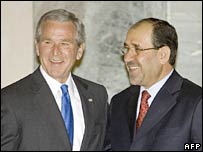 It was all rather sudden, formal, and expected. Iraq's Prime Minister Nouri Maliki was only given a five-minute warning before meeting the guest for talks at the US embassy in the fortified Green Zone. The quest was none other than President George W. Bush.
It was all rather sudden, formal, and expected. Iraq's Prime Minister Nouri Maliki was only given a five-minute warning before meeting the guest for talks at the US embassy in the fortified Green Zone. The quest was none other than President George W. Bush.The trip, indeed, the very plan had been secret. That is something this particular Administration is good at doing so the news should not be a shock. The president had been chairing talks in the US on future policy in Iraq and had been due to speak to Mr Maliki via videophone from Camp David.
Once the story broke, most correspondents said the trip comes amid a rare mood of optimism in the White House about events in Iraq. This is true, last weeks killing of the leader of al-Qaeda in Iraq, Abu Musab al-Zarqawi, and the appointment of ministers in the Iraqi government for defense, security and the interior are seen as giant leaps forward for progress in Iraq.
Though the Administration would also like to capitalize on the nine-point jump to 49% a recent poll result on American attitudes toward “winning the war in Iraq” I would caution readers on this. The surprise visit might have Administration officials hoping for continued momentum, but all they will get out of this visit is the residual effect of what the official visit really did. Recent developments and President Bush’s visit has buttressed the credibility of Iraq's new government.
The visit was the correct strategic move for a crucial foreign leader facing immense domestic pressure. Such a visit has given legitimacy to Mr. Maliki’s recent security crackdown in Baghdad following the death of Zarqawi, including measures such as a curfew from 2100-0600 and a ban on all vehicle traffic on Friday lunchtimes to try to curb attacks during Friday prayers. Amidst the pomp and flare of such a visit further unrest around the country, the latest, at least 16 people were killed in a wave of blasts in the northern city of Kirkuk. So, as the leaders discussed the next steps for Iraq in talks with their advisers and the Iraqi Cabinet with Mr Maliki saying he hoped the suffering of Iraq would come to an end and all foreign troops would return home and the president saying to reporters afterward that Iraq was part of the US “war on terror” for the short term, at least, nothing will change.
President Bush told the Iraqi prime minister, "Iraq's future is in your hands". It is also still in the United State’s. We should remember what the president said next, "when America gives its word, it will keep its word…it's in our interest that Iraq succeeds." One hopes that real troop withdrawals were discussed privately and a timetable agreed upon. In the meantime, positive steps forward for all.
Monday, June 12, 2006
Show Me The Money
 In 1960, part of his farewell address to the nation, President Eisenhower warned of the growing relationship between business and the military. The term that everyone is familiar with is military industrial complex. Ironic that such a warning would come from the most popular military general in this country since George Washington, who consequently warned in his own presidential farewell address about entangling alliances with foreign nations. Through forces and events that either could have foreseen as well as the sheer willpower of successive president’s, generals, and businessmen, both Washington and Eisenhower have been ignored.
In 1960, part of his farewell address to the nation, President Eisenhower warned of the growing relationship between business and the military. The term that everyone is familiar with is military industrial complex. Ironic that such a warning would come from the most popular military general in this country since George Washington, who consequently warned in his own presidential farewell address about entangling alliances with foreign nations. Through forces and events that either could have foreseen as well as the sheer willpower of successive president’s, generals, and businessmen, both Washington and Eisenhower have been ignored.It should not be surprising then to read or hear about Halliburton receiving large military contracts in Iraq, but still the playfully ignorant American citizenry shows dismay. The simple fact is that private military contractors are earning billions of dollars in Iraq -- much of it from U.S. taxpayers. Business is booming for those willing to tackle one of the most dangerous jobs on Earth. Lucrative U.S. government contracts go to firms called on to provide security for projects and personnel -- jobs that in previous conflicts have been done by the military.
A single contract awarded to Britain's AEGIS Specialist Risk Management company by the Pentagon was worth $293 million, and while the government says it cannot provide a total amount for the contracts -- many of which are secret (surprise)-- industry experts estimate Iraq's security business costs tens of billions of dollars.
These contractors have not been without controversy. A US based company, Blackwater, one of the larger companies and perhaps the best known, because tragedy befell its employees in Falluja March 31, 2004. Four employees were killed -- two of their bodies hung from a bridge. It should be stated that Blackwater also looks for opportunities beyond war zones to disaster areas, such as the Gulf Coast after Hurricane Katrina, or places where peacekeepers could be stationed, like the crisis-hit region of Darfur in Sudan (there is an idea for the ineffectual UN).
But where there is money, there is also danger. And this is the point of my post today. No official totals exist of how many private contractors have been killed in Iraq. Many analysts believe the death rate among the 25,000 or so contractors higher than among U.S. military forces. This is something the public has a right to know. I challenge my American readers to contact your representatives. Raise this issue in letters to the editor and amongst friends. If our tax dollars go to these firms then Congress should be informed as to how much money is actually spent and for what. Here is an issue that our representatives should become impassioned about. Sadly, they seem too preoccupied.
Sunday, June 11, 2006
The World Cup
 It started two days ago. It has received very little news in the US national press, but I suspect that will change tomorrow when the home team plays it first match. No, I am not talking about baseball or the NBA finals, both of which are on prime time television. I am talking about the World Cup.
It started two days ago. It has received very little news in the US national press, but I suspect that will change tomorrow when the home team plays it first match. No, I am not talking about baseball or the NBA finals, both of which are on prime time television. I am talking about the World Cup.It is for a short time every four years that I have my television on most of the day. My wife just shakes her head at me with a smile. Herself, being European, she understands my foreign fascination with the sport that is obsessed over by men and boys, and in increasing larger amounts, women too, throughout the rest of the world.
This year the World Cup is being hosted by Germany. Similar to what occurs during the Olympics, teammates find themselves on opposite sides as friendly rivals. Football, the word that truly defines the sport, with highly paid athletes fighting aggressively on the pitch (field) for the round ball. A sport that has literally united a country torn by civil war and in the case of the United States given recognition to a sport often in the shadows of other major-league sports in America.
For those who are interested on times and match-ups and, more importantly, what channel to watch, other than Univison, the best interactive menu on the World Cup is done by the New York Times online. If you go to the website provided below, it is in the upper right, entitled, Cup Tracker.
http://www.nytimes.com/pages/sports/soccer/index.html
If, reader, you do not watch soccer, as it is called in the US, I recommend you tune in for a brief time. ESPN2 as well as ABC are providing the coverage on the games. The commentary is in English and easy to follow. With other sport coverage, such as the NBA finals this week, I challenge those of us in America to compare the difference in attitude, sportsmanship, and refereeing. It is enlightening.
As I write this post, the Netherlands, has just beaten Serbia and Montenegro 1-0. Today, on ABC at 10:30am CST, Iran vs. Mexico in a first-round game in Nuremberg, Germany. Later today, at 1:55pm CST on ESPN2 Angola vs. Portugal play in a first-round game in Cologne, Germany.
So, grab a beer and chips, and be prepared to shout GOOOOAL.
Saturday, June 10, 2006
Health Care, Again
There are now, in the most recent estimates, about 45.8 million uninsured Americans (8.3 million of them children), up from 39.8 million in 1994. Premiums for family coverage in employer-sponsored insurance — the way most Americans under 65 get their coverage — have risen by 73 percent in the past five years, according to the Henry J. Kaiser Family Foundation.
Mrs. Clinton often frames the problem today as one of economics as much as social justice. She asserts that soaring health costs are weighing down American corporations and hindering their ability to compete in a global marketplace, against countries with government-financed health benefits or no expectation of health coverage at all. This is correct and an important distinction between 1994 and 2006. Corporation and small business were against the universal health-care plan in 1994. Slowly, though only whispers at the moment, it is these very same former opponents that are going to ask the government to take over providing health-care.
As reported in the New York Times Mrs. Clinton has not pushed a comprehensive coverage plan in her first term in the Senate. As part of the Democratic minority, she has primarily focused on defending existing programs from cuts by conservatives.
In campaign stops and interviews, Mrs. Clinton is quick to admit errors and thereby distance herself from the old plan. "I think that both the process and the plan were flawed," she has said "We were trying to do something that was very hard to do, and we made a lot of mistakes." That was then and now is now. Health-care is an issue of our own choosing. Corporations and smaller companies through adjusting to market changes and unfortunately caving to personal greed and ambition, forced an issue, once considered an idea of the fringe minority, to be center stage in several mid-term races and will prove to be a top issue in the 2008 presidential election. For opponents who wish only for this issue to go away, it will not happen. For proponents who wish for a style of health-care originally proposed by Mrs. Clinton back in 1994, she will not be proposing such a plan ever again. What will occur is another debate. This is proper, but for the sake of children and families without health insurance let the debate be short, legislation reasonable, and implementation fast.
Friday, June 09, 2006
Good News, yet a Warning
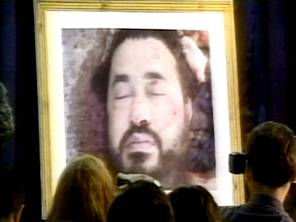 A mortally wounded Abu Musab al-Zarqawi was still alive and mumbling after American airstrikes on his hideout and tried to get off a stretcher when he became aware of U.S. troops at the scene, a top military official said Friday. This was an extension on the initial reporting that al-Zarqawi had been killed by the Air Force strike.
A mortally wounded Abu Musab al-Zarqawi was still alive and mumbling after American airstrikes on his hideout and tried to get off a stretcher when he became aware of U.S. troops at the scene, a top military official said Friday. This was an extension on the initial reporting that al-Zarqawi had been killed by the Air Force strike.Though this assassination removes from Iraq an obstacle that had been hindering the Iraqi government and U.S. military al-Zarqawi was not the main obstacle and sadly his death will not help the rebuilding of Iraq move any faster.
Iraq's new prime minister, Nouri al-Maliki, vowed to "build on the additional momentum gained from the death" of Zarqawi to defeat terrorism and the sectarian violence that the Jordanian fomented between the country's newly empowered Shiite Muslim majority and disaffected Sunni Muslim Arabs who form the bulk of the insurgency. On a personal note, he has demonstrated his credibility as someone who is tough on security.
This is good and clearly it al-Zarqawi’s death is a boost for the new Iraqi government.
President Bush has cautioned that while al-Zarqawi's death, while a major blow to the al-Qaeda terrorist network will not end the war. In an op-ed piece published in today's Washington Post, Maliki said his government would capitalize on the death of al-Zarqawi to "kick start extensive reconstruction," promote "genuine national reconciliation" and intensify the development of the national military and police. He also said his newly completed cabinet would launch initiatives to "secure the capital and confront the ethnic cleansing" taking place around it, strengthen the government's intelligence services, disband armed militias and "fight corruption from the top down."
http://www.washingtonpost.com/wp-dyn/content/article/2006/06/09/AR2006060900473.html
Al- Zarqawi's death provides opportunities, both for the Iraqi authorities and for the insurgents. The insurgents might also use this as a chance to refocus their campaign, perhaps concentrating their fire on the security forces, and away from the attacks on civilians that al-Zarqawi pursued so cynically. That in turn could help the fractured insurgency to work together more effectively, and might also help them win more support from the Iraqi people.
Iraqis who remember the brief surge of optimism that followed the capture of Saddam Hussein in 2003 will remember this, the American public and American military should take remember this too.
P.S. The death of al-Zarqawi made headlines around the world. The headline from Egypt’s Al-Ahram was most fitting.
EGYPT'S AL-AHRAM
There was no other conceivable end for Abu Musab al-Zarqawi but his killing. The man murdered hundreds of innocent Iraqis, and his organisation, al-Qaeda, spread horror and blood in Iraq as well as tears everywhere and killed innocent people in cold blood. His actions in Iraq were an extension of his criminal, terrorist activity in Jordan. This man, with both Ayman al-Zawahiri and Osama Bin Laden, is one of the people who have afflicted Islam and Muslims with disaster. Each of them bears full responsibility for the negative picture that afflicted Muslims everywhere worldwide... The fall of Zarqawi per se will not mean the end of violence in Iraq, because he was not the only man responsible for these acts, as there are many elements and several organisations.
The discovery of truth
This makes me think of Emerson how he stressed to start each day "unaffected, unbiased, unbribable, unaffrighted." For all of those who have graduated from high school or secondary school and are preparing to go off to university, remember these words.
Education is more than textbooks, tuition, and parties. It is the entire process. Debate, dissent, and exposure to a variety of ideas and opinions. I hope all of you out there embarking on the next part of your life journey realize this and embrace it.
Have a great day!
Wednesday, June 07, 2006
1979, Again?
http://www.cnn.com/2006/POLITICS/06/07/midterm.california/index.html
Please keep in mind that this district was conservative so regardless of national mood or media spin there was never any real threat for the Republicans losing it.
For the moment there does not seem to be a Democratic wave. Republican strategists were firm in stating that House races were not subject to national moods. Though this must be seen as nothing more than spin there is an even more startling fact: with two years before he leaves office, the president is a lame duck, made impotent by his own Party. This can clearly be seen on the very issue of immigration that helped Brian Bilbray win his seat. This is the issue where conservative politicians and candidates are openly opposed to the president’s plan. With President Bush traveling the nation this week promoting the Senate bill and compromise talks between the Senate and the House versions he has never been seen as more ineffectual than now.
It reminds me of 1979. In 1979 we had an “energy crisis” over oil, we had residual immigration troubles in various states that had welcomed Cuban and Haitian refugees and we had an international crisis with Iran. Most interestingly, out of all the similarities are the political ones. The president and his Party controlled Congress and the Executive, yet the president was seen as unable to control his Party. For all of President Carter’s personal faults in office, most presidential historians agree that not having the full support of his fellow Democrats in Congress was a serious blow to his leadership ability, effecting not only policy but public perception as well.
The very same thing can be described now. It forces one to ask the question, who is in charge, the president as leader of his Party or the Republican Congress? Events as of late would suggest that as President Bush attempts to appease his conservative base the more the conservative base opposes him and as elected Republicans oppose him this undermines Bush’s leadership.
Two questions now are raised. The first is whether or not such a power struggle will adversely affect the Party in the fall elections. The second is with internal divisions temporarily occupying Republican attention, can the Democrat’s find a resonating message, pick their spokespeople, and most of all, stick with them both?
Tuesday, June 06, 2006
Boots in the sand
 As my prior posts have indicated I am emotionally attached to Sudan. This is a country and the genocide (that is what it is!) in Darfur in which I cannot be impartial and unbiased.
As my prior posts have indicated I am emotionally attached to Sudan. This is a country and the genocide (that is what it is!) in Darfur in which I cannot be impartial and unbiased.A top-level UN team says it has so far been unable to convince Sudan to allow a UN peacekeeping force in the troubled region of Darfur. The main reason: Sudan objects to a UN force replacing 7,000 African Union (AU) peacekeepers. Some Sudanese officials see the hand of the US behind the UN effort. The UN, however, says it will not deploy peacekeepers without Sudan's approval, reiterating instead, that it must act to stop the killings. "It was underlying to the president that that can only happen with the consent of the government," delegation chief and UK ambassador to the UN Emyr Jones-Parry said after meeting Sudanese President Omar al-Bashir. "But it's our wish that we continue discussions to get that consent and that the transition takes place as soon as we can manage it."
http://news.bbc.co.uk/2/hi/africa/5050910.stm
Before meeting President Bashir, the UN delegation met a coordinator of government affairs, Mr. Deng Alor, officially known as the minister for the council of ministers and Foreign Minister Lam Akol. Before the meeting, Mr. Akol had suggested to the BBC's Network Africa program that Sudan could accept a UN force, as long as it had a mandate to monitor, rather than enforce peace. Does anyone remember the name Serbenica?
This all is rather like taking the sucker out of the child’s hand, telling the child that candy is bad for them, and then giving the sucker back!
Let us review:
At least 200,000 (conservative estimate) have died in the conflict in the past three years, and two million people have been displaced. This while the UN and the Sudanese government has “talked”.
The African Union (AU) troops currently in Darfur are under-funded and poorly equipped, and have struggled to contain the violence. Last month, the AU called upon the UN to officially take over as soon as possible.
I am a patient man and I prefer diplomacy to violence. However, when the leading world organization, created to prevent war, has been consistently stalled in action and the very definition of diplomacy undermined, I say enough is enough. Let the UN send in its troops. The very actions by Khartoum demand such a resolution and physical action. It is only then can we bring small comfort to the scores of innocent children and women in Darfur.
Monday, June 05, 2006
Playing Poker with Hamas
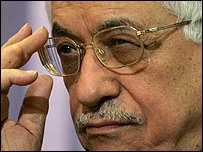 Palestinian leader Mahmoud Abbas confirmed today that he would call a referendum, date to be announced Tuesday, on his plan for statehood that implicitly recognizes Israel's right to exist. The move was announced as efforts to persuade the Hamas government to accept the idea of a Palestinian state co-existing with Israel failed. This is bold and correct.
Palestinian leader Mahmoud Abbas confirmed today that he would call a referendum, date to be announced Tuesday, on his plan for statehood that implicitly recognizes Israel's right to exist. The move was announced as efforts to persuade the Hamas government to accept the idea of a Palestinian state co-existing with Israel failed. This is bold and correct.Fatah recognises Israel, but Hamas officially wants an Islamic state in Israel, the West Bank and Gaza. Its charter also calls for Israel's destruction.
The plan Mr Abbas will put to non-binding a referendum is an 18-point program agreed by various faction members jailed by Israel. It sets out formal Palestinian claims to an independent state on land occupied by Israel in 1967, as well as the right of all Palestinian refugees to return to former homes inside Israel. The document also calls for continued resistance within lands occupied by Israel in 1967, suggesting that attacks inside internationally recognized Israel would end.
Mr. Abbas has made a strategic move. Though his political party, Fatah, lost the elections back in January due to being largely seen as correct and ineffectual, most Palestinian’s vote for Hamas was not an endorsement as much as a slap to Fatah. Mr. Abbas understands this, while Hamas does not. By forcing a referendum that in all probability will pass, Hamas will be put into a difficult situation—supporting popular opinion that is at odds with official Party ideology. Mr. Abbas understands this and is using it to his advantage. If such a referendum does in deed pass, this might be the opening needed for the United States to become involved once again.
This story is on-going, but for a brief moment, Mr. Abbas has showed true leadership, sticking up for not only what is right politically but also right morally.
Sunday, June 04, 2006
Czech Elections Deadlock
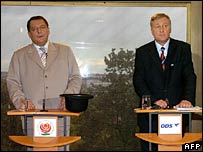 The Czech general election has ended in deadlock with the conservative opposition slightly ahead but with no clear prospect of forming a government. Exit polls suggested a decisive victory for the Civic Democrats over the Social Democrats after they promised to cut tax and fight corruption.
The Czech general election has ended in deadlock with the conservative opposition slightly ahead but with no clear prospect of forming a government. Exit polls suggested a decisive victory for the Civic Democrats over the Social Democrats after they promised to cut tax and fight corruption.But according to the full preliminary results, they and their allies won only half the seats in parliament. Prime Minister Jiri Paroubek(left in picture) has refused to admit defeat.
What does all this mean?
Nothing and everything. It is nothing because the election had been supposed to put an end to four years of political instability. The result clearly shows this not to be. It is everything for the reason that Czech politics needs to reflect Czech politicians new accountable attitute toward Czech citizens. With Communist candidates winning local elections and holding a portion of seats in Parliament, with the Czech president, elected in 2002, a former communist, economic problems, unemployment, and little difference between the two Party's except the first word, the beacon for democracy in New Europe should live up to its expectations that, for a brief, moment under President Havel did.
Saturday, June 03, 2006
Red Meat for Dumbo
 It would have to be foreign news to report on such a story. The president in his weekly radio address spoke about gay marriage, calling for its ban in a Constitutional Amendment.
It would have to be foreign news to report on such a story. The president in his weekly radio address spoke about gay marriage, calling for its ban in a Constitutional Amendment.http://news.bbc.co.uk/2/hi/americas/5044428.stm
It is fitting for him to make such a plea—over the radio—since very little of the American public listen to his radio address. An amendment stands little chance of being passed but analysts say Republicans see the issue as a vote winner in November's mid-term polls. These analysts also say the president is seeking to switch the spotlight onto positive issues for his party in the wake of his slumping popularity - particularly over Iraq.
I question such strategy. If this “issue” is such a vote winner, then I wonder as to whom else besides social conservatives and card-carrying Republican’s, such a move will attract? Most poll-surveys of Americans list gasoline prices, wrapped in the dubious phrase of an energy crisis, immigration, health-care, social security and education as serious domestic issues. Add to this list the umbrella issue of national security and one can see where an amendment banning gay marriage ranks.
If, as it is said, that the spotlight is deliberately being switched to positive issues for the Republican party, I ask how is such a divisive and negative emotional issue, positive? And what are the other issues? Once, again, only social conservatives and rank-in-file Republicans, as of late, the two having blurred to the point that they exist as one cohesive group will only see this as a positive issue. This is not an issue that will attract moderates. This is not an issue that those undecided soldiers (if any ever existed) in a protracted culture war will finally see as reason to join the “right” side. The fact is that moderates have been marginalized into leaving the Republican Party. The few that remain are voiceless. The Log Cabin Republicans, the national gay and lesbian grass roots organization within the GOP have been ignored by the White House, the National Republican Committee, and blacklisted on most high-ranking Party lists.
http://online.logcabin.org/
Fiscal conservatives have seen the very principles that they and their forefathers subscribe to eradicate under Ronald Reagan and now particularly by George W. Bush.
So what can be the rationale, if any, of such a move? Is it just more red meat for the masses? Well, a segment of the masses will be appeased no doubt, and since those very citizens make up the majority of the Republican Party it is a tactical move, nothing more. What I mean to say is that such an issue helps only Republican candidates running in the fall elections. Making the announcement through the medium of his radio address, President Bush, was able to speak directly to his core supporters, thus circumventing any subversion and threat of backlash. A safe issue for social conservatives, a safe issue for the Party, and a safe choice for the president to be seen acting on.
Friday, June 02, 2006
A Handshake
This news which was talked about on CNBC, covered sporadically in the Financial Times and the Wall Street Journal, finally occurred. It exposes two questions and a glaring understatement.
The first question is how long will this last? My analysis leads me to conclude that the merger is here to stay. Similar to early skeptics on the EEC and the EU this merger once in effect will enter into the next phase of skeptics and predictions. If anyone is a gambling individual, I would bet on its survival. The second question is was this necessary in the first place? Fifty years ago, no. Twenty years ago, no--even six years ago, no. However, the world market has changed much. The sheer volume of business conducted, number of international companies or multi-national corporations involved has forced substantial changes in the financial market that necessitates a new approach. What this question underscores is the realization that each individual is no longer separate. People, countries, workers and companies are all interdependentt of each other. No tunnel vision. The future is the present, the past is useful yet ultimately unsustainable.
Thursday, June 01, 2006
Iraq, the Marine Corp, and historical footsteps
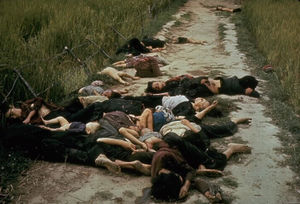
This post unfortunately must be brief. For reasons currently unexplainable I am experiencing technical difficulties with my blog template.
I did wish to remain true to my prior post and mention in this blog the alleged massacre by United States Marines of Iraqi citizens.
I would like to state first that the news reports have made me VERY angry and sad. I grew up with military men in my family and was taught to respect the uniform. I watched with youthful satisfaction the CBS television series JAG and in our current conflicts firmly support our troops abroad. It is with a heavy heart that I read news reports such as this one, in particular because of my affinity to the Marine Corps. With that said:
If, when the various investigations are completed it is proven true that those particular Marines did in fact kill innocent civilians then those held responsible should be part of a court-marshal. This includes not only the soldiers in the immediate area involved in the killings but up the chain of command to the company commander, regimental commander as well as the battalion commander. I abhor the idea that the commanders on the ground have to issue ethics training. This is something that should be part of basic training as well as continuous on-the-ground training. To issue such orders after such an incident sends an equally bad image to our allies and the people in countries were we are providing protection and security.
Most important of all: Restitution should be given to the surviving family members.
Psychology of soldiers is fascinating. These men and women volunteer to protect their country. The military training program is indoctrined legalized killing, which is done rather efficiently. However, the public still expects their fellow citizens to have moral's and when particular missions become nasty (as they all do) public conscience recoils with the discovery that our trained killers do not have an "off" switch. I am in no way excusing the actions of the men in this particular story. I applaud the military for being forthright to the media and the Iraqi government, contrary to initial action reports. However, this entire affair reminds me a little too bit like the infamous Lt. William Calley and the massacre at My Lai during the Vietnam War. The lessons of that war and of that massacre can be applied to our current war in Iraq. An indiscernible enemy is the worst because the very rules of engagement our soldiers are trained to follow do not apply. Another lesson and this one is very important. Battlefield stress is very real. Our troops serving abroad have had their deployments extended to the point that the adverse effects now are being seen. Rotating troops, in and out of the theatre of operations is not the answer either. Our military leaders know the answer. The question is will our politicians listen?
Rolling the dice with Iran, again
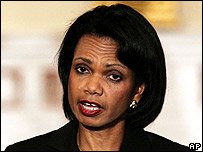 There has been a major shift regarding the US and Iran. Diplomacy, or lack there of with Iran has changed. This is good.
There has been a major shift regarding the US and Iran. Diplomacy, or lack there of with Iran has changed. This is good.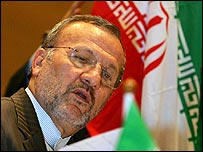
It is possible that Iran will agree to explore the idea of talks, though its initial response has been to say that talks would be acceptable but that suspension of enrichment is unacceptable. If that attitude continues, there will be no talks.
On the other hand, it appears to have reached a plateau in its current enrichment programme, having announced that it has enriched uranium to nuclear power levels.
This is both a positive and a negative for the United States. The two factions in the Bush Administration the doves and the hawks are preparing for anything. The doves, a chance for peaceful resolution that will avoid open military conflict. The hawks, lead by Vice-President Cheney, preparing for the breakdown of talks and refusal on any agreement, which then might improve their position on the need for action. Secretary Rice, who yesterday announced the Administration's intention to join in talks with Iran is considered a leading dove (interesting what a title means). The situation in Iran is the same. Yes, even in a theocracy there are doves and hawks, we just call them hardliners and moderates.
The bigger question for both is given the chance to talk will they? Or will each use the rhetoric of the other to avoid the tough decisions that amount to peace.

